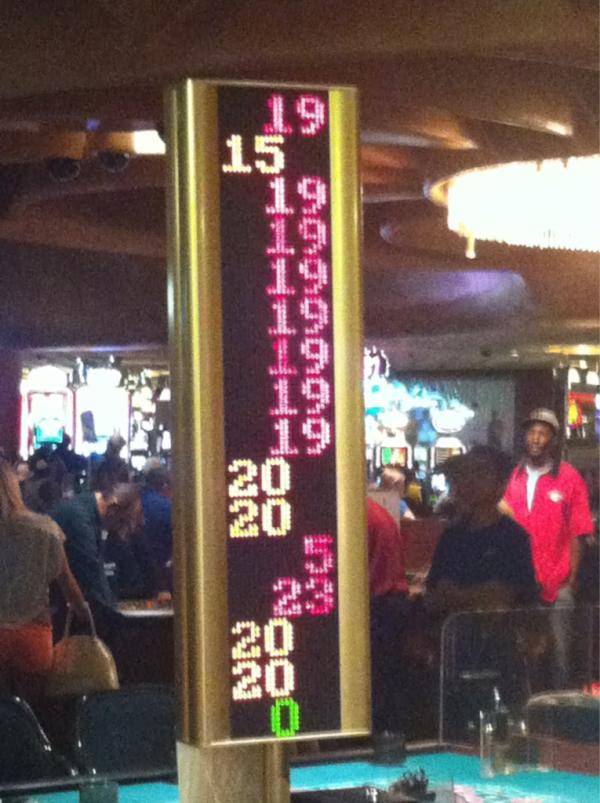The Las Vegas Sun carried this photo and story online earlier this week:

Before we specify what this statistic is based on, the odds of it happening are 3 billion to 1.
Those are the odds against a roulette wheel hitting the same number on seven consecutive spins. But that did happen, or certainly appears to have happened, at the Rio at 8:32 p.m. Monday as pro poker player Jeff Romano took a photo of a roulette wheel display screen showing the No. 19 hitting on seven straight spins. The string was broken when the wheel landed on 15, then hit 19 once more for a run of eight 19s in nine spins.
The display screen lists the most recent 16 numbers on which the ball lands on a roulette table. Four of the numbers in Romano’s photo are 20, meaning that in this particular stretch, two numbers were landed upon 75 percent of the time. The string started with a green zero, followed by 20-20-23-5-20-20, then the run of 19s.
The the odds of the 19s hitting seven times in succession as 3 billion to 1 (the original version of the column cited incorrect odds as being 14 billion to one, which statistics experts have since noted were far longer than the single number 19 hitting seven times in a row). Contacted this afternoon to ask for verification of the event and if the wheel has since been tested to make sure it is properly balanced and calibrated, Caesars Entertainment officials had not yet learned of the event.
We’re awaiting word on what is certainly one of the rarest documented roulette runs in the city’s history.
I don't buy it. If that mathematically improbable event had occurred, Caesars officials would certainly know about it -- that kind of anomaly gets attention in a casino.
Also, in the photo, there are a couple of empty seats at the roulette table. If the same number had come up so often, it would absolutely have drawn a crowd. I've been at enough craps tables to know that when a shooter goes on an extended run of passes, it brings both spectators and more gamblers, just as when a blackjack player goes on a streak and turns a small amount of chips into a huge stack. If 19 had come up that often in a short time span, a lot more people would have gathered to bet on it. People want to be where the action is, so why aren't they around this gaming miracle?
In general, those display screens were responsible for increasing the amount of money bet on roulette wheels, because the general public doesn't understand the concept of independent chance. There is no statistical correlation between what happened on the last roll and what will happen on the next roll. Like the dice on a craps table, the roulette ball and wheel don't have a memory, unlike a blackjack shoe where a card-counter can know whether there are more high cards or low cards left in the deck. But when people look up and see that the number 7 or 13 or 28 hasn't been landed on in awhile -- or that 19 has been hit twice in the last ten rolls -- they plunk down their bets (unaware that the house's edge on roulette is among the highest in the casino).
So what really happened? The Rio was very likely running some diagnostics on their equipment, placing the ball instead of spinning it, making sure the numbers posted properly, and perhaps vetting some new croupiers to ensure they made the right payouts and collected bets quickly. In other words, it wasn't a 3 billion to 1 shot. It was only a test.
If I were a gambling man, I'd bet on it.Labels: picture of the day, poker/vegas

